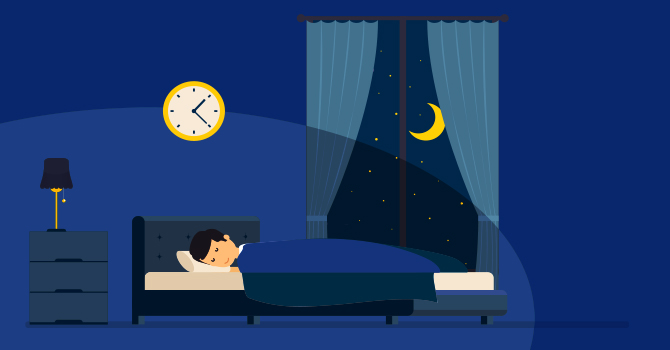You need sleep. We all do.
Sleep is the period of rest. Sleep is what gives your body time to rest and allows it to prepare for the next day. It is a state of consciousness where we have limited interaction with our surroundings.
Stages of sleep
There are four stages of sleep that are divided into two categories. The first three stages fall into the category of Non-REM sleep and the fourth (last stage) is REM.
The first stage of sleep is a transition period between wakefulness and sleep. During the second stage your body enters a more subdued state. This includes a drop in temperature, relaxed muscles and slow breathing and heart rate. Stage three of sleep, also known as deep sleep, is when muscle tone, pulse, and heart rate decreases even more. In the final stage, REM sleep (rapid eye movement) your voluntary muscles become immobilized, which prevents you from acting out your dreams.
According to SleepFoundation.org, “The structure of a person’s sleep stages and cycles is known as their sleep architecture. While deep sleep and REM sleep involve more profound changes in activity levels, experts believe that each stage plays a part in a healthy sleep architecture that generates quality sleep.”
Well, now you know what sleep is, but what are its benefits?
Improves your mood
Sleeping improves energy levels, and being well rested has a positive impact on an individual’s mood. “A chronic lack of sleep can lead to anxiety, depression, and irritability. However, developing a consistent sleep routine often resolves these symptoms,” states the SleepFoundation.org article “8 health benefits of sleep.”
Regulates blood sugar
Sleeping also has a positive impact on the body’s relationship with the hormone insulin. Insulin is a hormone that lowers the levels of glucose in the blood. Sleep helps blood sugar (glucose) enter the body’s cells. Sleeping at least seven hours a night helps ensure that glucose levels are regulated.
Mental function positivity
Sleep is thought to help with memory and conjunctive thinking. The brain plasticity theory is a theory of why we sleep. It says that sleeping is necessary so the brain can grow, reorganize, restructure, and make new neural connections. These connections in the brain help people learn new information and form memories while we sleep. In other words, a good night’s sleep can help you do better with problem-solving and decision-making.
Stable heart
Having a good sleep promotes cardiac health (The health of the heart and blood vessels). During sleep your heart slows down. This helps that your heart and vascular system have time to rest. Without sleep, blood pressure can remain high for an extensive amount of time, leading to a higher risk of heart disease, heart attack, and heart failure.
Athletic positivity
Sleep plays one of the biggest keys when it comes to athletic recovery.
“The body’s production of growth hormones is highest during sleep. These growth hormones are necessary for the repair of tissue and likely contribute to muscle growth. Most athletes require eight hours of sleep each night for restoration and to avoid over training and improve their performance,” states the Sleep Foundation.
Without sleep, athletes are also at risk of low performance, fatigue, and changes in mood. Exercising with less sleep also increases the risk of injury.
Because sleep is vital to our health, we need to recognize problems we might have so we can sleep better. According to the U.S. Office of Disease Prevention and Health Promotion, things like anxiety, pain, health conditions, medicines, alcohol and drugs can make it harder for people to sleep.
AJMS student perspectives on sleeping
Kaylah Marroquin: “I sleep at least five hours a day, um, because I sleep late. Sleep helps me escape reality.”
Kaylah enjoys sleeping and wishes she had a chance to sleep for more time so she can escape reality for even longer.
Yanelly Gomez: “Oh, um, so I go to sleep at 11 and wake up at 6. Seven hours.”
Yanelly says she really likes to sleep and wishes she could sleep on Saturdays, but she can’t because of SRLA.
Roselyn Martinez: “I go to sleep at 10 or 11 and wake up at 6.”
She just sleeps. Good night.













angel • Jan 9, 2024 at 12:39 pm
There is more than one stage of sleep.
yanelly • Jan 9, 2024 at 12:32 pm
I learned that there are four stages of sleep
Jocelyn Gomez • Jan 8, 2024 at 12:43 pm
I learned that sleeping gives you more energy